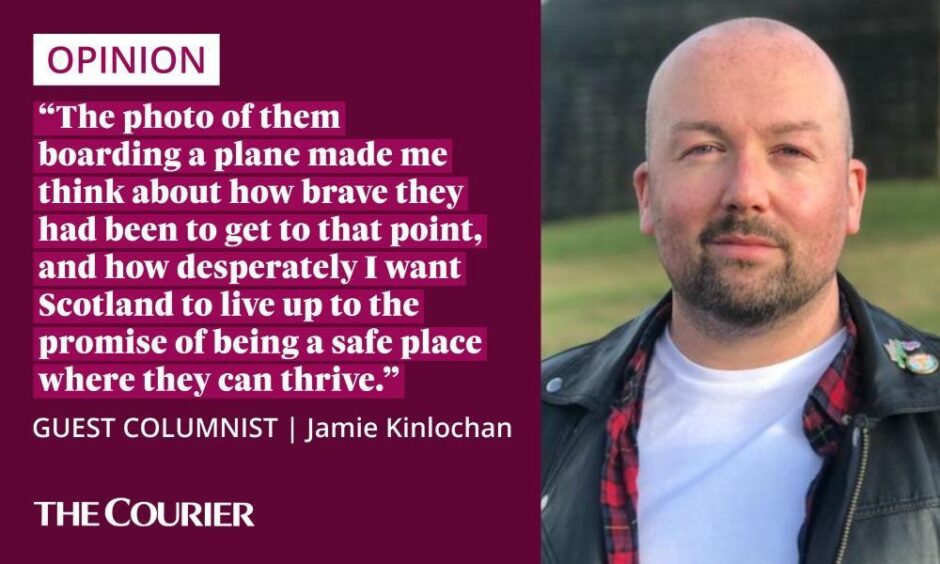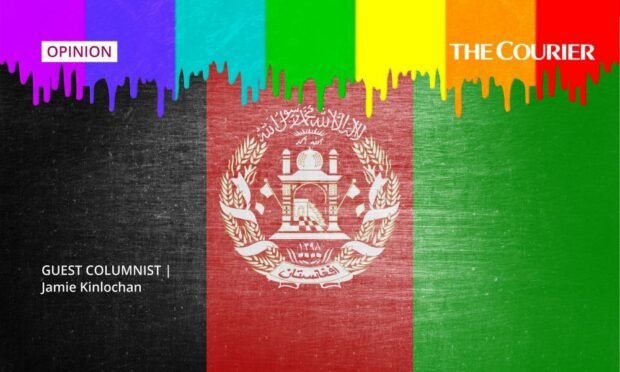Two groups of people arrived in the UK this week. One you will know about and one, you probably won’t.
Delegates, state leaders and the world’s media arrived for COP26 in pursuit of agreement on a way forward to slow climate change.
At the same time, a group of 29 brave LGBT people whose lives were at risk in Afghanistan touched down in pursuit of safety.
They are just as precious and just as important as those who are arriving to fanfare and ceremony.

The impact of COP26 on Glasgow, its potential to bring the climate back from the brink and the star power of the event has dominated the news cycle for what feels like months.
And for good reason.
As Scotland welcomes world leaders, experts and campaigners on their quest to stop climate change, no stone has been left unturned to make sure visitors are well looked after.
Glasgow’s most visited tourist destination and the most visited museum in the UK outside of London, Kelvingrove, has been closed to the public for a fortnight while invite only events are held there.
A previously impossible travel pass has been created, allowing visitors and those supporting the workings of the conference to hop on all public transport for free with just a wave of their shiny blue card.
Two cruise ships have been chartered for COP26 personnel to stay on because hotel rooms are so expensive and hard to find.
And airports across Scotland have opened up to enormous, rarely seen cargo planes, some of which have flown US President Joe Biden’s motorcade across the Atlantic.
A different welcome for asylum seekers
We have never gone to such lengths to accommodate those fleeing persecution and seeking asylum.
The group who arrived this week is made up of people who were already under serious threat of persecution.
Their lives had been placed in imminent danger since the withdrawal of international troops and the subsequent return of the Taliban.
The photo of them boarding a plane made me think about how brave they had been to get to that point, and how desperately I want Scotland to live up to the promise of being a safe place where they can thrive.
1/ An update on Rainbow Railroad’s work in Afghanistan:
Earlier today, 29 #LGBTQI+ Afghans arrived in the U.K. as part of a special operation coordinated by the U.K. Gov., @RainbowRailroad and @stonewalluk. This photo shows them embarking from an undisclosed location. pic.twitter.com/Nm6SdA90Yb
— Rainbow Railroad (@RainbowRailroad) October 29, 2021
This group will be resettled through a new UK Government scheme specifically for those displaced by the withdrawal of troops from Afghanistan.
However, most asylum applications in the UK come from people fleeing Iran, Eritrea, Sudan and Iraq.
All are countries with poor human rights records and where being gay is either punishable with death or imprisonment.
Same sex relationships are, shockingly, still criminalised in 69 UN member states.
Asylum seekers can enrich our communities
We can and should do so much more to to help the small number of people seeking asylum in the UK to realise their potential.
But instead of rolling out the red carpet, as we have for world leaders this week, too often we make life difficult for those fleeing persecution.
After rejecting almost half of asylum applications, we generally offer people low quality social housing that everyone else has turned down.
They receive an impoverishing stipend of £39.63 a week to live on and are given no access to education.
These are not the kind of circumstances that lead to people doing well.
We can’t punish people into achieving their potential.
The United Kingdom's highest-circulation print newspaper dives deep into the lives of Afghanistan's LGBT+ community. @MetroUK @oliver_gmurphyhttps://t.co/9XWkMej4ac
— Nemat Sadat (@nematsadat) October 31, 2021
With Covid-19 still part of our lives and a climate crisis that needs our attention, this is a time of immense challenge.
We need the skills and energy of everyone who can contribute to the success of our communities in the future.
Inclusion in Scotland has taken huge leaps forwards in recent decades. We are in a great position to do this.
Huge leaps for LGBT people in my lifetime
When I was at school, the government banned teachers from talking to me about being gay.
Now, LGBT history is part of the school curriculum in Scotland.
Growing up I didn’t imagine that having children and getting married would be possible.
Now, the government prohibitions on both have been lifted.
Progress isn’t progress, however, if we keep it to ourselves.
Everyone should know what it feels like to belong somewhere, to feel like they are contributing to the common good.
There are many reasons that lead to people seeking asylum.
And we are well positioned here to support people live a free and fulfilled life.
We have turned an entire city upside down so a small group of people can talk for a few days.
It is surely in our gift to extend compassion, dignity and opportunity to those who have come to us because they are not safe in their home countries.
Jamie Kinlochan is a campaigner for social justice and a consultant, working to tell the stories of those who are often unheard.
